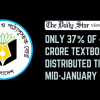Textbook fiasco: End excuses, act now

The government's repeated failure to deliver textbooks on time to crores of students is both unacceptable and indicative of systemic inefficiency. Despite promises from the National Curriculum and Textbook Board (NCTB), countless children have once again been left without the essential tools for education, reflecting a disregard for the future of the nation's youth.
Following a political changeover and the formation of an interim government in August 2024, delays in textbook distribution became inevitable.
However, in October, the NCTB assured the public that all 40.15 crore textbooks for over four crore students would be delivered by December 31. This assurance contradicted warnings from the Printing Industries Association, which had already predicted that the process might extend until March.
As the December 31 deadline neared, the NCTB scaled back its target. On December 29, the board informed The Daily Star that only 13.5 crore books would be distributed by the year's end. Yet, by January 1, only six crore books had been delivered, leaving crores of primary and secondary students without crucial learning materials.
This glaring shortfall exposed a lack of planning and transparency.
Contradictory statements from the government and NCTB officials compounded confusion over the issue.
On January 1, during a programme, NCTB Chairman Prof AKM Reazul Hassan said all primary and tenth-grade books would be delivered by January 5, eight secondary textbooks by January 10, and the remaining books by January 20.
Just days later, on January 7, Chief Adviser's Deputy Press Secretary Abul Kalam Azad Majumder claimed that printing would be completed within January and the distribution could be done within that timeframe.
However, on the same day, Education Adviser Wahiduddin Mahmud said he was unsure when the distribution could be completed.
"I don't know when all students will get textbooks," he said attributing the delays to the late start of printing in September and political unrest.
Wahiduddin further commented on the issue on January 8. This time, he noted that delays in textbook distribution were not uncommon, citing an instance where distribution was completed as late as July.
In the latest development, Press Secretary to the Chief Adviser Shafiqul Alam, on January 9, said all students would receive textbooks by February.
However, taking into account how things have gone so far, the ongoing fiasco has eroded public trust in the government's ability to handle this recurring issue.
Since 2010, the government has provided free textbooks at the start of the academic year to crores of primary and secondary students, many of whom rely solely on these for education. It is true that the previous governments too often failed to deliver the textbooks on time.
However, there is no denying that the delays are disrupting the learning of students, with teachers struggling to conduct lessons.
The problem points to a larger issue: a lack of accountability. Textbook distribution is an annual, scheduled task. Yet, it continues to be plagued by delays, inefficiencies, and excuses.
In October 2024, a TDS report pointed out that printing problems, delays in the tender process and book revisions, and poor coordination among suppliers as reasons for the delays -- all foreseeable problems that the government failed to address.
This crisis also casts doubt on the government's broader education reform agenda. How can the government implement meaningful reforms, such as curriculum updates or improved teaching methods, when it cannot meet the basic requirement of timely textbook distribution?
The NCTB and the Ministry of Education must prioritise accountability and transparency to address this recurring issue.
Concrete steps are needed to break this cycle of failure. First, the government must set realistic timelines for textbook distribution, replacing vague assurances with actionable plans. Second, individuals or entities responsible for the delays must face consequences. Third, the entire textbook distribution process requires an overhaul, including better planning, stricter monitoring, and improved coordination among all stakeholders.
Education is the foundation of a nation's progress. The repeated failure to deliver textbooks on time is not merely an administrative lapse, it is a betrayal of the country's future. The excuses must end, and the government must demonstrate that education is a priority. Ensuring timely textbook delivery is the least it can do to support children in their pursuit of learning and success.

 For all latest news, follow The Daily Star's Google News channel.
For all latest news, follow The Daily Star's Google News channel. 









Comments